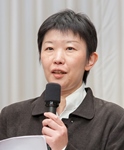��Rotary Foundation Month�� Meeting
Seventy-Year Postwar History of Germany
November 11,2015
Dr. Asako Anayama
Senior Chief Researcher,
Research Institute of Info-Communication Medicine Former Rotary Scholar
 ��Germany has come under the global spotlight recently, with its leading role among EU nations in the Greek debt crisis earlier this year. In September, Chancellor Merkel announced that Germany would accept Syrian refugees which made towns and cities in the country struggle to accommodate massive waves of migrants and activated the extreme rightists. The Merkel Administration faces the largest crisis since its inauguration ten years ago.
��Germany has come under the global spotlight recently, with its leading role among EU nations in the Greek debt crisis earlier this year. In September, Chancellor Merkel announced that Germany would accept Syrian refugees which made towns and cities in the country struggle to accommodate massive waves of migrants and activated the extreme rightists. The Merkel Administration faces the largest crisis since its inauguration ten years ago.
��While Germany has been enjoying an economic boom for several years, it faces criticisms from other EU countries with economic difficulties. This year marks the 70th anniversary of the end of World War II and the 25th anniversary of the reunification of East and West Germany. The fall of the Berlin Wall on November 9th, 1989, was partly triggered by a massive influx of people from East Germany to Western countries. I think the current influx of refugees bring back those memories to many Germans.
��Since the Meiji Restoration, Japan has regarded Germany as a forerunner of modernization in various fields, including politics, economy, arts and culture. Japan has forged relationships with Germany over 150 years. But we must not forget that Germany instigated the two World Wars that claimed so many lives.
��The Nazi Party, led by its leader Adolf Hitler, collapsed in May 1945, followed by the surrender of Germany to the Allied Forces on May 8th that ended World War II in Europe. Hitler had committed suicide 10 days before. The Nazi Party came into power in 1933 and turned the country into a fascist totalitarian state. Numerous studies prove that this regime was a ��war state�� based on radical ��racism�� and aimed to conquer Europe. As many as 6 million Jews, 200,000 gypsies, 70,000 handicapped Germans as well as citizens in Russia and Poland fell victim to the ��holocaust�� (meaning completely burnt in Jewish). An enormous number of people also sought refuge and asylum in the US and the Middle East that brought significant change to the world��s population distribution.
��Germans were regarded as victimizers after the War and became traumatized by the atrocities. To date, not a few Germans suffer from suspicions that their family members could have been responsible for persecutions and crimes. It is fair to say that German society, since the end of the War to date, has been striving to deny every element related to the Nazi times. From 1945, the Allied Forces divided and ruled Germany into four occupation zones, with priorities on ��denazification,�� ��democratization�� and ��decentralization.�� This Allied-occupied Germany continued up to the establishment of East and West Germany in 1949. West Germany pursued democratization in the 1960s and 1970s, propelled by the anti-Vietnam War campaigns and various movements initiated by students, environmentalists and feminists. The younger generation with postwar education came to objectively examine crimes committed during wartime. East Germany, on the other hand, became a dictatorial regime and had restrictions on speech and the press. Therefore, they lacked information and education to face the brutal crimes committed by the Nazis.
����To overcome the past�� is the term that explains how the Germans have faced their criminal past and have constructed historical understanding. Let me highlight three major points.
��Firstly, the Nazi regime is accused of unspeakable murders for its crimes against humanity. To date, Nazi war criminals are still being indicted. It is also legally banned to deny crimes committed by the Nazis, to violate the victims and to praise Nazism.
��The second point is the issue of reparations and compensation paid to the victimized individuals and countries. Germany has been making payments to date, in various forms including compensation and pensions. After 1952, West Germany paid an enormous amount of reparations to Israel and 12 neighboring countries as well as compensation for Jewish property confiscated by Nazi Germany. East Germany also made extensive payments to countries such as Russia and Poland. Recently, companies have come to be held accountable for forced labor. In 2000, leading companies and the government provided funds and established the ��Remembrance, Responsibility and the Future�� Foundation. It currently provides compensation to forced laborers in about 100 countries. It has widely been accepted in Germany that payments to victims are necessary to regain its position in the international community, while Germans also understand that no compensation can do justice to so many precious lives taken away.
��The third important point is educating the next generation. The Allied Forces shared the urgent need to establish democracy by making the Germans face their history through education. Children in West Germany were educated on the brutal history of Nazi Germany and the responsibilities of its government. Extensive programs have been developed for the younger generation, including study tours to concentration camps. In 2006, Germany published a history textbook co-written with one of the victimized countries, France, indicating how far reconciliation had been achieved.
����Policies taken for the past�� best describe the 70-year postwar history of Germany. Successive political leaders have made it clear, both within and outside Germany, that they would commit themselves to face their history, compensate the victims and to educate the next generation. Germany is surrounded by 9 countries. Having been subject to severe scrutiny by victimized countries, Germany has faced up to its past and came to gain international trust and became one of the leading countries in the EU. I am sure Japan can learn from such cool-headed political calculus.